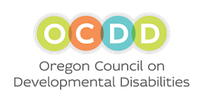The Developmental Disabilities Assistance and Bill of Rights Act (“DD Act”)
Congress passed the first Act to benefit people with developmental disabilities and their families in 1963. It has been amended several times, most recently in 2000 (view DD Act). In 1963, the number of people with developmental disabilities living in crowded institutions was still on the rise. The census of people living in institutions peaked in 1967 at approximately 195,000. By 1996 the numbers were down to about 60,000 people in institutions, and the census continues to drop.
Vision of the DD Act
Individuals with developmental disabilities and their families have opportunities and support to:
Make informed choices and decisions;
Live in homes and communities in which they can exercise their full rights and responsibilities as citizens;
Contribute to their family, community, state and nation;
Have interdependent friendships and relationships with others; and
Achieve full integration and inclusion in society, consistent with the unique strengths, resources, priorities, concerns, abilities and capabilities of each individual.
Mission of the DD Act
Individuals with developmental disabilities and their families participate in the design of and have access to:
Culturally competent services, supports and other assistance
Opportunities that promote independence, productivity, integration and inclusion into the community.
Goals of the DD Act
To help individuals with developmental disabilities and their families increase:
Independence
Productivity
Integration
Inclusion
So that they can:
Exert control and choice over their lives
Engage in income-producing
Use the same community resources that are used and available to other citizens
The DD Act provides federal money to the states to fund State Councils on Development Disabilities, University Centers for Excellence, Protection and Advocacy Systems, and Projects of National Significance.
Councils on Developmental Disabilities (“DD Councils”)
Developmental Disabilities Councils consist of volunteers appointed by governors, over half of whom must be people with developmental disabilities or their family members. They engage in systemic change, capacity building, and advocacy activities that:
Educate the public;
Develop and support coalitions;
Inform federal, state, and local policy makers;
Demonstrate new approaches to services, supports and other assistance;
Outreach to those who might not come to the attention of the Council;
Assist neighborhoods and communities to respond positively to individuals with DD and their families;
Foster interagency collaboration and coordination, including related Councils, committees and programs;
Eliminate barriers and enhance citizen participation.
University Centers for Excellence in Developmental Disabilities Education, Research and Services
Centers for Excellence promote the health and safety of individuals with disabilities by acting as a national pipeline of highly-skilled professionals who are trained specifically to work with individuals with developmental disabilities and their families. Centers also produce new knowledge in the field of developmental disabilities through research and model program development and evaluation. Centers are recognized as leaders in every major disability related initiative that has emerged over the past 20 years including:
Early intervention;
Assistive technology;
Supported employment;
Community living;
Positive behavior management.
In Oregon the Centers are located at the University of Oregon and Oregon Health Sciences University.
Protection and Advocacy System (“P&As”)
The Protection and Advocacy System is a comprehensive network of programs which provide legally-based representation for people with disabilities. Congress created the P&A programs upon learning about the abusive, neglectful and inhumane living conditions at Willowbrook, a New York State institution for people with developmental disabilities. Congress recognized that a federally-directed system of legal advice was necessary “to ensure the humane care, treatment, habilitation and protection of” people with mental retardation and other developmental disabilities. In Oregon the P&A agency is the Disability Rights Oregon (DRO).
Projects of National Significance
Projects of National Significance support national and state policy and play a significant role in assuring health, safety, rights, and employment for individuals. Examples of projects include:
Developing Personal Assistance Services that enable individuals with developmental disabilities to assume responsibility for themselves to attend school and work;
Training police and other criminal justice personnel to recognize and respond to people with disabilities during conflict;
Assisting young adults with disabilities to transition from high school to higher education, job training, or employment; and
A First Jobs project that promotes individuals with developmental disabilities to obtain work experience, increasing their skills for future employment and careers.
Congress funds Projects of National Significance to collect information and measure our nation’s success at ensuring safe, healthy, meaningful lives for our citizens with developmental disabilities. The data provides important guidance for governors and state legislators to evaluate, plan and implement policy to achieve desired outcomes.
